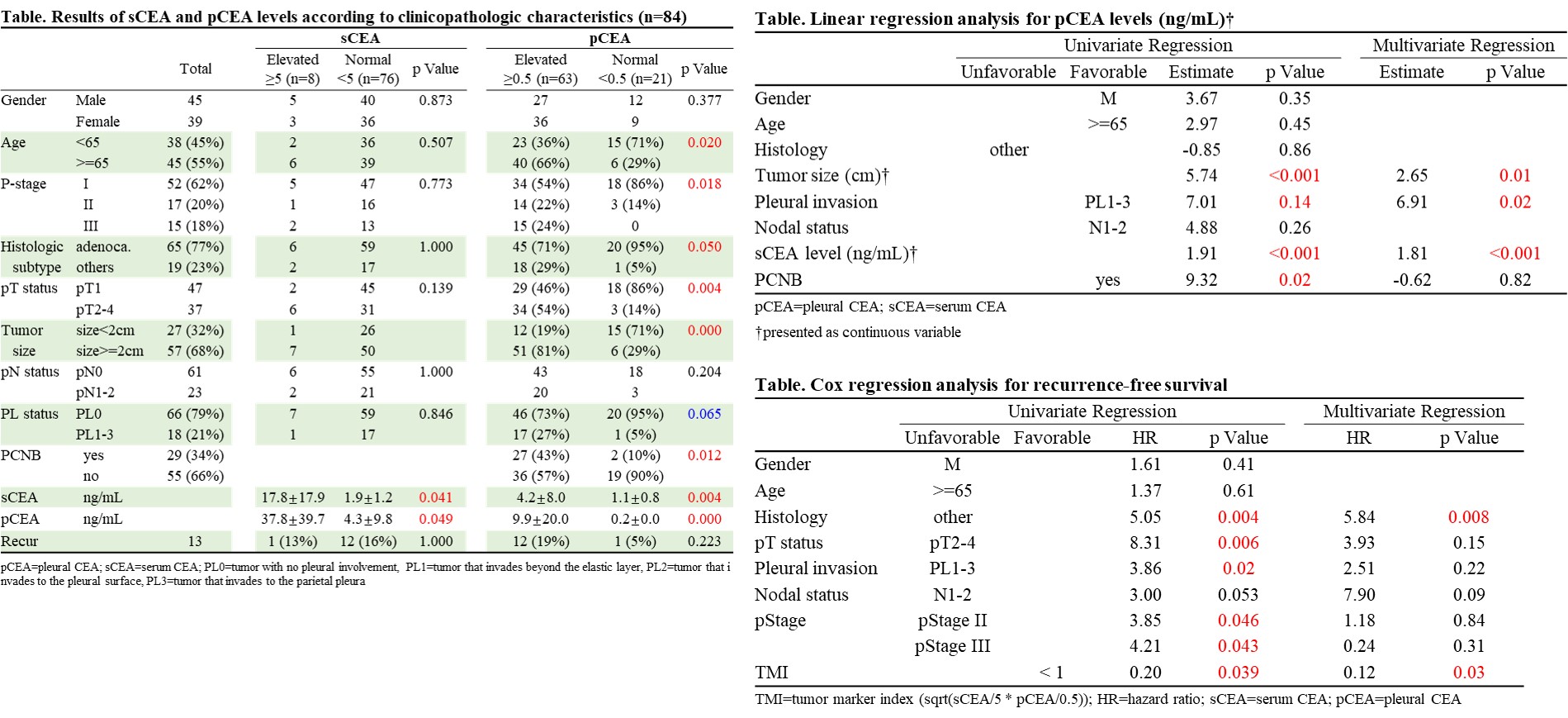초록접수 현황
| 20F-174 | 구연 발표 |
Clinical significance of elevated pleural CEA in surgically treated NSCLC patients
Kwanyong Hyun, Seok Whan Moon, Mi Hyoung Moon, Kyung Soo Kim
Department of Thoracic and Cardiovascular Surgery, Seoul St. Mary's Hospital, The Catholic University College of Medicine, Seoul, Republic of Korea
Purpose : This study evaluates the tumor marker index (TMI) based on serum CEA (sCEA) and pleural effusion CEA (pCEA) levels as a potential prognostic determinant for patients with non-small cell lung cancer (NSCLC).
Methods : Eighty-four NSCLC patients who had undergone surgical resection and pleural effusion study from 2018 through 2019 were included in the study. TMI was defined by taking the geometric mean of normalized values of sCEA and pCEA levels (the square root of (sCEA/5.0 ng/mL)*(pCEA/0.5 ng/mL)). We determined the discriminatory value of the TMI as 1.0 since the TMI cannot be greater than 1.0 when sCEA and pCEA levels are within normal upper limits.
Results : Sixty-three patients had elevated pCEA levels. Median sCEA and pCEA levels were 2.04 and 1.40 ng/ml, respectively, showing positive correlation (p<0.001). There were 39 patients with a TMI less than or equal to 1.0, and 45 patients with a TMI greater than 1.0. With a median follow-up of 12.3 months, disease recurred in 13 patients (15%). Multivariate Cox regression analysis showed histology with non-adenocarcinoma (HR 5.84; p=0.008) and TMI less than or equal to 1.0 (HR 0.12; p=0.03) independently predicted recurrence.
Conclusion : The TMI based on sCEA and pCEA levels is a composite of normalized values which had higher predictive value for NSCLC recurrence than sCEA and pCEA alone. The TMI may be useful for predicting the recurrence as a marker of tumor burden and subclinical microdissemination.
Methods : Eighty-four NSCLC patients who had undergone surgical resection and pleural effusion study from 2018 through 2019 were included in the study. TMI was defined by taking the geometric mean of normalized values of sCEA and pCEA levels (the square root of (sCEA/5.0 ng/mL)*(pCEA/0.5 ng/mL)). We determined the discriminatory value of the TMI as 1.0 since the TMI cannot be greater than 1.0 when sCEA and pCEA levels are within normal upper limits.
Results : Sixty-three patients had elevated pCEA levels. Median sCEA and pCEA levels were 2.04 and 1.40 ng/ml, respectively, showing positive correlation (p<0.001). There were 39 patients with a TMI less than or equal to 1.0, and 45 patients with a TMI greater than 1.0. With a median follow-up of 12.3 months, disease recurred in 13 patients (15%). Multivariate Cox regression analysis showed histology with non-adenocarcinoma (HR 5.84; p=0.008) and TMI less than or equal to 1.0 (HR 0.12; p=0.03) independently predicted recurrence.
Conclusion : The TMI based on sCEA and pCEA levels is a composite of normalized values which had higher predictive value for NSCLC recurrence than sCEA and pCEA alone. The TMI may be useful for predicting the recurrence as a marker of tumor burden and subclinical microdissemination.

책임저자: Seok Whan Moon
Department of Thoracic and Cardiovascular Surgery, Seoul St. Mary's Hospital, Catholic University of Korea, Seoul, Republic of Korea
발표자: Kwanyong Hyun, E-mail : k.hyun@catholic.ac.kr


